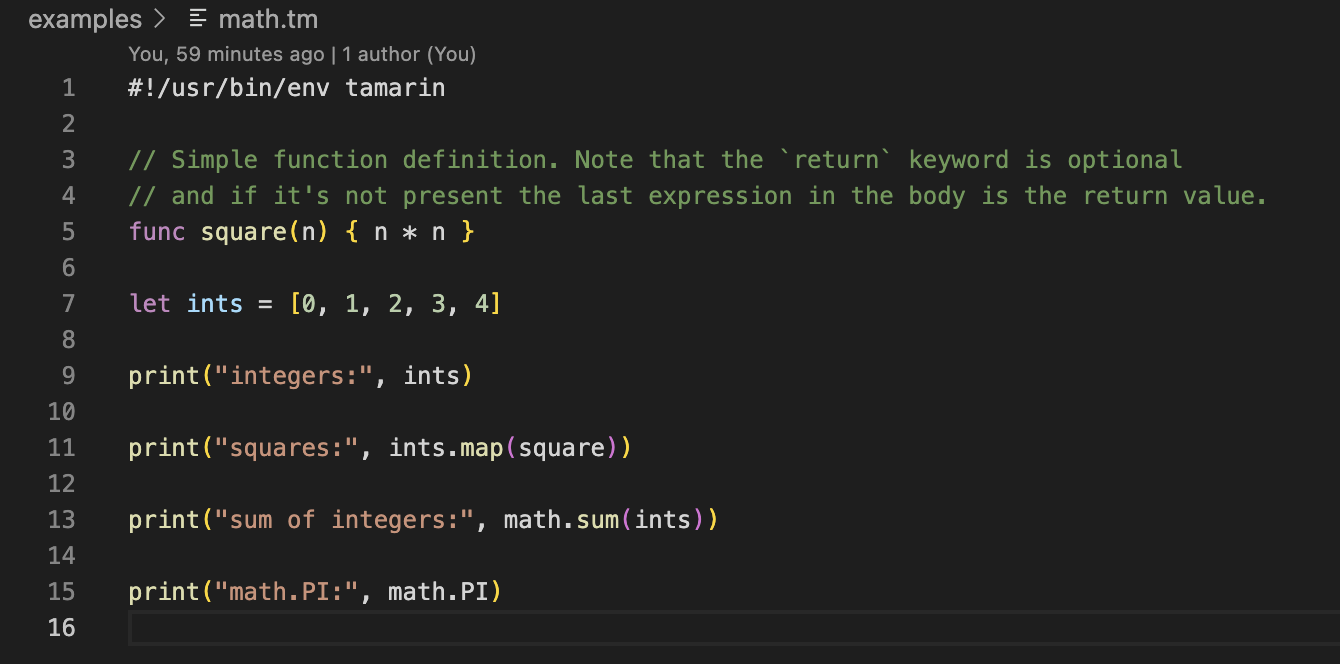A fun and pragmatic scripting language written in Go. May be used as a CLI or embedded as a library.
This project is very early and should be considered alpha software. Please visit the Github discussions page for Tamarin to share thoughts and questions!
Tamarin is meant to be useful for web, cloud, and general backend scripting. The syntax should be familiar to Go, Typescript, and Python developers. The language should be "batteries included" with a large and handy standard library (this is a work in progress).
Miscellaneous popular Go open source libraries may be integrated into the Tamarin standard library. Please share suggestions for what you think would be good additions on this front!
We are using Tamarin to evaluate user-submitted scripts in sandboxes, but there are many other situations where Tamarin may be useful. Because of this initial use case, we chose to not support file I/O operations at this point, however those will be added as an opt-in feature.
It is not currently considered important to be performance competitive with widely used scripting languages. If you are looking for top performance you should probably be using sandboxed V8/Javascript or Lua.
- Familiar syntax inspired by Go, Typescript, and Python
- Growing standard library which generally wraps the Go stdlib
- Includes higher level libraries that are beyond the Go stdlib
- Currently libraries include:
json,math,rand,strings,time,uuid,strconv,sql - Control which libraries are available during execution
- Built-in types include:
set,hash,array,regexp, and more - Functions are values; closures are supported
- Evaluation is cancellable using Go contexts
- Library may be imported using the
importkeyword - Easy HTTP requests via the
fetchbuilt-in function - Pipe expressions to create processing chains
- Error handling inspired by Rust, using a Result type
Try the Tamarin CLI as follows:
go install github.com/cloudcmds/tamarin@latest
echo 'print("hello")' | tamarin
You can also use Tamarin as a library, however please be aware Tamarin has not yet reached a stable 1.0.0 release yet, so the APIs are likely to change. That said, fundamental changes are not anticipated at this point. See cmd/simple-example/main.go for an example of using Tamarin as a library.
To execute a Tamarin script, pass the path of a script to the tamarin binary:
$ tamarin ./examples/hello.tm
Scripts can be made executable by adding a suitable shebang line:
$ cat hello.tm
#!/usr/bin/env tamarin
print("Hello world!")
Execution then works as you would expect:
$ chmod 755 hello.tm
$ ./hello.tm
Hello world!
See docs/Features.md.
A Tamarin VSCode extension is already available which currently only offers syntax highlighting.
You can also make use of the Tamarin TextMate grammar.
Work in progress. See assorted.tm.
🎉 This project is just getting started. Tamarin is intended to be a community project and you can lend a hand in many different ways.
- Please ask questions and share ideas in Github discussions
- Share Tamarin on any social channels that may appreciate it
- Let us know about any usage of Tamarin that we can celebrate
- Leave us a star us on Github
- File I/O was intentionally omitted for now
- No concurrency support yet
- No user-defined types yet
- Hash key collisions are unlikely but possible and not yet handled (a straight-forward fix)
- I'm sure edge cases exist that have poor error messages
A single value may be passed between successive calls using pipe expressions.
let array = ["gophers", "are", "burrowing", "rodents"]
let sentence = array | strings.join(" ") | strings.to_upper
print(sentence)
Output:
GOPHERS ARE BURROWING RODENTS
The intent is that if any call in the pipeline returns a Result object, that
object is unwrapped before providing it to the next call (or the pipeline aborts
if the Result is an error). This is not yet implemented.
There are two categories of errors in Tamarin. Severe errors which indicate a programming mistake
create *object.Error errors that abort evaluation immediately. These are similar to Go panics.
Operations that may fail return an *object.Result object that contains either an Ok value or
an Err value. This is inspired by Rust's Result type.
Result objects proxy to the Ok value in certain situations, to keep adhoc scripting concise.
is_err: returnstrueif the Result contains an erroris_ok: returnstrueif the Result contains the successful operation valueunwrap: returns the ok value if present and errors otherwiseunwrap_or: returns the ok value if present and the default value otherwiseexpect: returns the ok value if present or raises an error with the given message
Other method calls on the Result object proxy to calls on the ok value (or
raise an error).
Altogether this means programmers have reliable tools for handling errors as
values without requiring try: catch style exceptions. In quick scripts, you
can rely on Result method proxying if you want, while in situations requiring
robustness you can use the Result methods to check for and unwrap errors.
- Thorsten Ball and his book Writing an Interpreter in Go.
- Steve Kemp and the work in github.com/skx/monkey.
See more information in CREDITS.
Released under the MIT License. Copyright Curtis Myzie / github.com/myzie.



